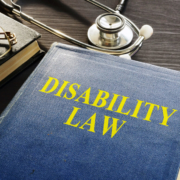Answers to Questions about Social Security Disability
1. How can I tell if I am disabled enough to apply for Social Security Disability benefits?
Social Security regulations make it easier to be found disabled as you get older. For individuals who are under the age of 50, the standards are very high, and the medical evidence needs to be fairly compelling that the symptoms from your diagnosed medical conditions preclude you from engaging in full time employment. It becomes easier to qualify for more people at age 50, as the Social Security Administration’s rules recognize the greater difficulty older people have in adjusting to new work situations. The rules become more relaxed for most people at age 55, and even more people at age 60. For individuals over the age of 55, the biggest problem is often whether they have the ability to return to any work they have done on a full time basis within the last fifteen years. If you’re over age 55 and you cannot do any job you have done in the past 15 years, you should definitely apply. If you’re over age 50 and have a severe impairment that keeps you from doing all but the easiest jobs, you should apply.
If you’re a younger person, you don’t have to be bedridden in order to be found disabled. But you need more compelling medical evidence. The rules require that you produce medical evidence supporting your disabilities, and the more medical evidence you can provide, especially objective test results such as MRI or x-ray reports, the better your chances are. If you are under the age of 50, you must provide medical documentation of conditions that are so severe that they keep you from being able to do any of the work you have done within the last fifteen years, and also, that keep you from being able to do any other work on a full time basis.
It is important to note that being unable to work and being found “disabled” by the Social Security Administration (SSA) are two entirely different things. The Social Security Administration does not consider the area in which you live – if there are jobs that exist in the nation you can perform on a full-time basis, the fact that these jobs are not near where you live does not matter. Also, the rules don’t consider factors such as you not being able to drive to work, or you don’t have transportation to get to work.
Also, even though your health may keep you from being able to work, unless your condition is medically documented, you most likely will not be found disabled. Many people lose their insurance when they become unable to continue with their jobs. That poses a significant problem in providing documentary evidence about the medical treatment. Sometimes, the Social Security Administration will order a medical exam, but you generally should not rely on the Social Security Administration’s medical personnel to prove the claim for you. The rules are clear that it is up to the individual claiming to be disabled to PROVE that they qualify for disability benefits.
If you really are unable to work, and have medical treatment to support your claim, you should apply for disability benefits. If you are denied, you should file a request for reconsideration, and then request a hearing before an administrative law judge. If you have applied, and your claim is denied, a lawyer with experience handling disability cases may be able to help you to figure out a way to win your case at the reconsideration or hearing before an Administrative Law Judge. Statistics show that people who are represented have a much greater chance of winning before a Judge. The sooner you get legal representation, the better your odds are of success because your representative will know the kinds of evidence that are needed to prove you qualify.
If the claim is denied by an Administrative Law Judge, that decision can be appealed to the next level – the Appeals Council. The odds of winning at the Appeals Council are very slim. Generally, if you have not already hired an attorney to assist you before the Administrative Law Judge, an attorney will not want to become involved with an appeal to the Appeals Council. The rules provide a presumption that the Administrative Law Judge was in the best position to evaluate the claim, and the Appeals Council only overturns the judge’s decision when there is clear evidence that the rules for evaluating the evidence were not followed.
2. How do I apply for Social Security disability or SSI benefits?
The Social Security Administration (SSA) offers three ways for you to apply for Social Security disability benefits:
- By telephone.
- In person at a local Social Security office. This is not available at this time.
- By the Internet.
If you want to complete an application for SSI or Social Security disability by telephone, you must telephone SSA at 1-800-772-1213. If you want to apply by phone, you will be given a date and an approximate time to expect a phone call from someone at the Social Security office who will take your application over the phone. The application will then be mailed to you for your signature.
If you want to use the Internet to apply, go to . If you want to apply for SSA’s other disability program — Supplemental Security Income (SSI) –you cannot complete an SSI application online but you can complete one of the necessary supporting documents, the Adult Disability and Work History Report, on the Internet.
3. Do you have any advice about applying for disability benefits?
Yes.
- Give SSA all the information it asks for in a straightforward way.
- Be truthful. Do not exaggerate or minimize your disability.
- Get representation if your claim is denied initially. Although you can request further appeals, unless you provide some different information, your claim will probably turn out the same way at reconsideration or with the Administrative Law Judge. If your claim is denied, parts of the claim are not being properly documented, but if you don’t understand the rules, it will be hard for you to fix it.
- When you complete the Disability Report, a form that SSA requests completed at the time the application is submitted, explain how your medical impairments keeps you from working. Your explanation must show why you cannot do any job you have done in the past 15 years and also address why are unable to do other work.
4. What happens if I am denied benefits and I do not appeal within 60 days?
You’ll have to start over with a new application. Starting over is different from an appeal. It means that you will lose any back benefits you would have been entitled to receive under the first application. There is a financial cost to missing deadlines, as well as the loss of the time put into the first claim — your new claim will start at the very beginning. Additionally, the evidence used to deny your claim the first time will still be considered on your second claim, so your odds of winning on the second claim are actually worse. It is very important to appeal all denials within 60 days. It’s better if you appeal right away – there is no advantage to waiting sixty days to do something that can be done right away. The more you delay, the slower your case will be processed in a system that is already a fairly slow bureaucracy. The faster you get your appeals filed, the quicker you can get to the hearing stage, which is where the best chances of success are.
5. How do I appeal?
Your denial letter will tell you about appealing. The first appeal is called a “reconsideration.” You must request reconsideration and then, after the reconsideration is denied, you must request a hearing within the 60-day time limit.
6. What are the two biggest mistakes people make when trying to get disability benefits?
- Failing to appeal. More than half of the people whose applications are denied fail to appeal. Many people who are denied on reconsideration fail to request a hearing. If you are genuinely unable to work full time, you should appeal.
- Not getting appropriate medical care. Some people with long-term chronic medical problems feel that they have not been helped much by doctors. They may stop going for treatment. Or there is not much money to pay for doctor visits. Failing to get medical treatment is a mistake. The single most part of your disability claim is your medical treatment records. The better your medical evidence, the stronger your case for disability is.
7. Since medical evidence is so important, should I have my doctor write a letter to the Social Security Administration and should I gather medical records and send them to SSA?
SSA will gather the medical records, so you don’t have to do that. Whether you should ask your doctor to write a letter is a hard question. A few people win their cases by having their doctors write letters. You can try this if you want to. The problem is that the medical-legal issues are so complicated in most disability cases that a doctor may inadvertently give the wrong impression. Thus, obtaining medical reports may be something best left for a lawyer to do.
8. How much do lawyers usually charge?
Most lawyers represent people on Social Security Disability or SSI claims on a “contingent fee,” basis. This means the lawyer is paid a fee only if you win your case. The usual fee is 25% (one-quarter) of any back benefits you get, up to a maximum limit set by SSA. The maximum fee which can be charged for claims handed before the Social Security Administration is $6,000. Most times, however, the fee is much less than $6000, because the fee is the lower of $6,000 or 25% of your back benefits. The fee comes from those benefits that build up by the time you are found disabled and benefits are paid. No fee comes out of current monthly benefits.
Although the fee will not normally exceed the maximum fee of $6,000, if your lawyer has to appeal your claim beyond a decision by an administrative law Judge, your fee agreement will still be limited to no more than 25% of your back benefits – so unless you win, there is still no fee.
In addition to the fee, many attorneys expect you to reimburse them for the expenses of gathering medical records, obtaining medical opinion letters, etc.


 ALJ hearing
ALJ hearing 

 ALJ hearing
ALJ hearing
Leave a Reply
Want to join the discussion?Feel free to contribute!